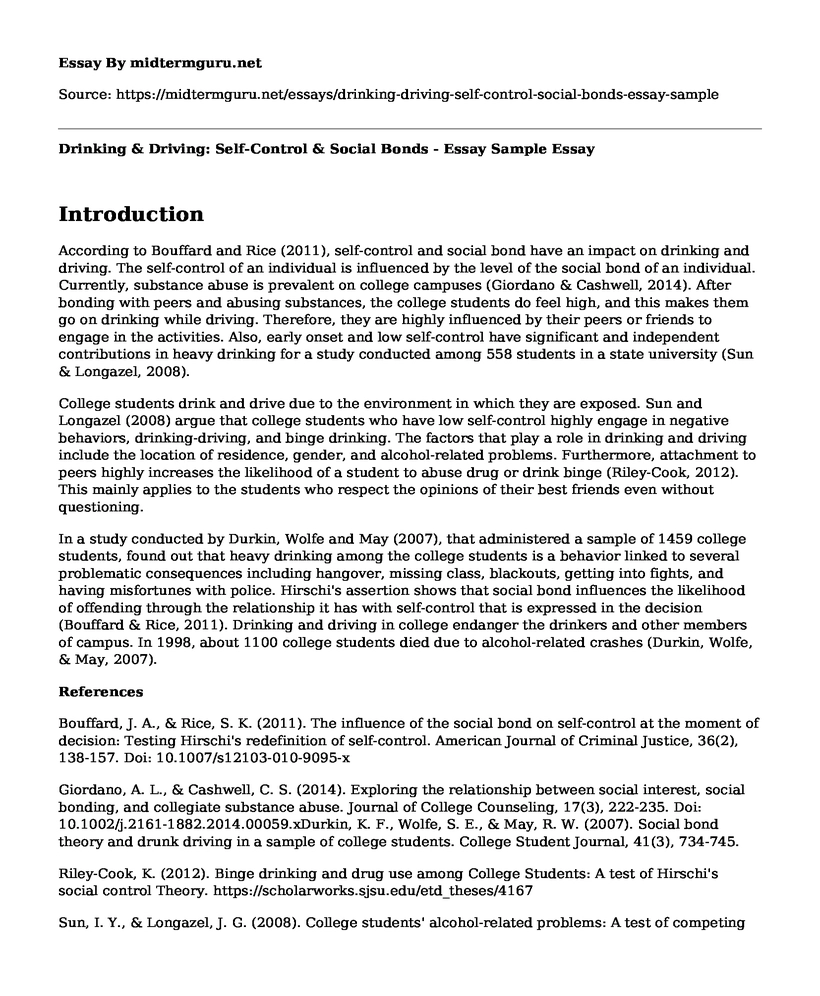Introduction
According to Bouffard and Rice (2011), self-control and social bond have an impact on drinking and driving. The self-control of an individual is influenced by the level of the social bond of an individual. Currently, substance abuse is prevalent on college campuses (Giordano & Cashwell, 2014). After bonding with peers and abusing substances, the college students do feel high, and this makes them go on drinking while driving. Therefore, they are highly influenced by their peers or friends to engage in the activities. Also, early onset and low self-control have significant and independent contributions in heavy drinking for a study conducted among 558 students in a state university (Sun & Longazel, 2008).
College students drink and drive due to the environment in which they are exposed. Sun and Longazel (2008) argue that college students who have low self-control highly engage in negative behaviors, drinking-driving, and binge drinking. The factors that play a role in drinking and driving include the location of residence, gender, and alcohol-related problems. Furthermore, attachment to peers highly increases the likelihood of a student to abuse drug or drink binge (Riley-Cook, 2012). This mainly applies to the students who respect the opinions of their best friends even without questioning.
In a study conducted by Durkin, Wolfe and May (2007), that administered a sample of 1459 college students, found out that heavy drinking among the college students is a behavior linked to several problematic consequences including hangover, missing class, blackouts, getting into fights, and having misfortunes with police. Hirschi's assertion shows that social bond influences the likelihood of offending through the relationship it has with self-control that is expressed in the decision (Bouffard & Rice, 2011). Drinking and driving in college endanger the drinkers and other members of campus. In 1998, about 1100 college students died due to alcohol-related crashes (Durkin, Wolfe, & May, 2007).
References
Bouffard, J. A., & Rice, S. K. (2011). The influence of the social bond on self-control at the moment of decision: Testing Hirschi's redefinition of self-control. American Journal of Criminal Justice, 36(2), 138-157. Doi: 10.1007/s12103-010-9095-x
Giordano, A. L., & Cashwell, C. S. (2014). Exploring the relationship between social interest, social bonding, and collegiate substance abuse. Journal of College Counseling, 17(3), 222-235. Doi: 10.1002/j.2161-1882.2014.00059.xDurkin, K. F., Wolfe, S. E., & May, R. W. (2007). Social bond theory and drunk driving in a sample of college students. College Student Journal, 41(3), 734-745.
Riley-Cook, K. (2012). Binge drinking and drug use among College Students: A test of Hirschi's social control Theory. https://scholarworks.sjsu.edu/etd_theses/4167
Sun, I. Y., & Longazel, J. G. (2008). College students' alcohol-related problems: A test of competing theories. Journal of Criminal Justice, 36(6), 554-562. Doi: 10.1016/j.jcrimjus.2008.09.007
Cite this page
Drinking & Driving: Self-Control & Social Bonds - Essay Sample. (2023, Jan 10). Retrieved from https://midtermguru.com/essays/drinking-driving-self-control-social-bonds-essay-sample
If you are the original author of this essay and no longer wish to have it published on the midtermguru.com website, please click below to request its removal:
- The Campaign Program: Volunteer to Advance the Quality of Education
- Essay Sample on Importance of Feedback
- Developmental Disabilities: Annotated Bibliography
- Paper Example on Behavioral Therapy
- Paper Example on Municipality C
- Essay Sample on Importance of Intracompany User Guides
- Reflective Essay on Volunteering







